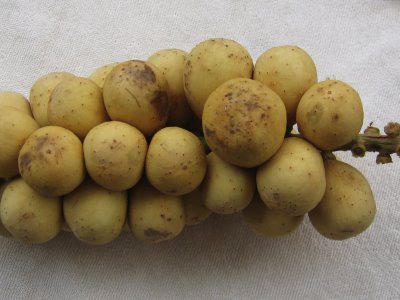The purple mangosteen (Garcinia mangostana), colloquially known simply as mangosteen, is a tropicalevergreen tree believed to have originated in the Sunda Islands and the Moluccas of Indonesia. The tree grows from 7 to 25 m (20–80 ft) tall. The rind (exocarp) of the edible fruit is deep reddish purple when ripe. Botanically anaril, the fragrant edible flesh can be described as sweet and tangy, citrusy with a flavour and texture similar to a peach.
The purple mangosteen belongs to the same genus as the other, less widely known, mangosteens, such as the button mangosteen (G. prainiana) or the charichuelo (G. madruno).
Mangosteen is a fruit found in tropical countries throughout Asia, for example Thailand, India, Malaysia, Vietnam and the Philippines. It also grows reasonably well in areas such as Hawaii and tropical Northern Australia from Innisfail north to Cooktown.
Benefits of Mangosteen
It has already been generally accepted (and widely advertised) that mangosteen extract is useful in the treatment of arthritis, acid dyspepsia, fibromylagia, moderate asthma, otitis externa and eczema. Now, the latest findings indicate that mangosteen has – in addition to its antioxidant effects – antimicrobial actions that inhibit the progression of acne. Furthermore, it is highly effective against the methicillin-resistant Staphylococcus aureus (MRSA), a bacterium responsible for staph infections.
Mangosteen is at least as effective as most pharmacological agents as far as antibacterial, anti-inflammatory and antifungal properties are concerned. Diabetics are increasingly in favor of its regular use and report that their need for insulin decreases considerably with the ingestion of mangosteen products.
The medicinal benefits of mangosteen will doubtlessly be heralded for a long time to come. Many more will be announced and either confirmed or dismissed in the process. At the moment, there is an understandable trend towards treatment with naturopathic agents like mangosteen extracts in lieu of prescription drugs.
Those properties may be taken as confirmed (unlike some of the miraculous benefits ascribed to it.) However, the highest testimonial that can be given for including this legendary (and certainly not inexpensive) plant in one’s diet is the fact that people who do apparently enjoy better overall health. This means that they appear to be less prone to disease and have higher energy levels than those who do not use mangosteen. They spend less money on prophylactic (preventive) medicines, pay fewer visits to doctors and hospitals and display a higher level of confidence in their health status.

